Keyword research is the solid foundation you need to succeed in your search engine optimization (SEO) strategy. It helps you target the terms your target audience uses so that you can drive more traffic to your site.
What’s more?
It helps you find out:
- How much traffic you could get if you ranked for a keyword
- Which content you need to rank for a particular keyword
- How challenging it will be to rank for a phrase
- Whether those searching can become customers
Well, now that you know why you need to do keyword research, let’s find out how to do it.
Keyword Research Strategy: 3-Step Process
If you just started your business, you likely need to start keyword research from scratch.
In this case, head over to step number two of this process.
However, if you’ve been running your business for a while, your first step will involve analyzing the keywords you’ve been trying to rank.
1. Analyze Current Keywords
Start by listing the keywords your business has been trying to rank for and determine if they are performing as expected.
For this, you will need an SEO tool or Google Console to track search volume and ranking history.
Then, separate poorly performing keywords from those that rank well.
But don’t stop there...
Expand your list of phrases by identifying keywords with potential from the non-performing list.
For example, those with high search volumes but low click-through rates.
2. Find Keyword Ideas
Start by considering your marketing funnel and content that would help guide your audience through it.
For example, what content would:
- Attract them to your website
- Educate them on your products or services
- Drive them to convert
- Make them loyal customers
Why do you need to understand all of this?
To find keywords that enable you to write quality content that attracts prospects likely to purchase.
What’s more?
It ensures you concentrate on keywords that benefit your business.
What’s the best way to identify the best keywords?
Brainstorm Topic Ideas
Start by understanding your niche, then brainstorm possible keywords.
For example:
If you sell pet food, some of the topics that would come to mind include:
- Best dog food
- Pet treats
- Homemade pet food
- Pet store near me
You can also brainstorm keywords by:
- Exploring Q&A sites, forums, social media groups, etc.
- Sending surveys and questionnaires to current customers
Note: Don’t forget to find possible keywords your potential customers would use for voice search.
Use Google Search
Type the word into Google, then check out the bottom of the search page for popular searches related to your keyword.
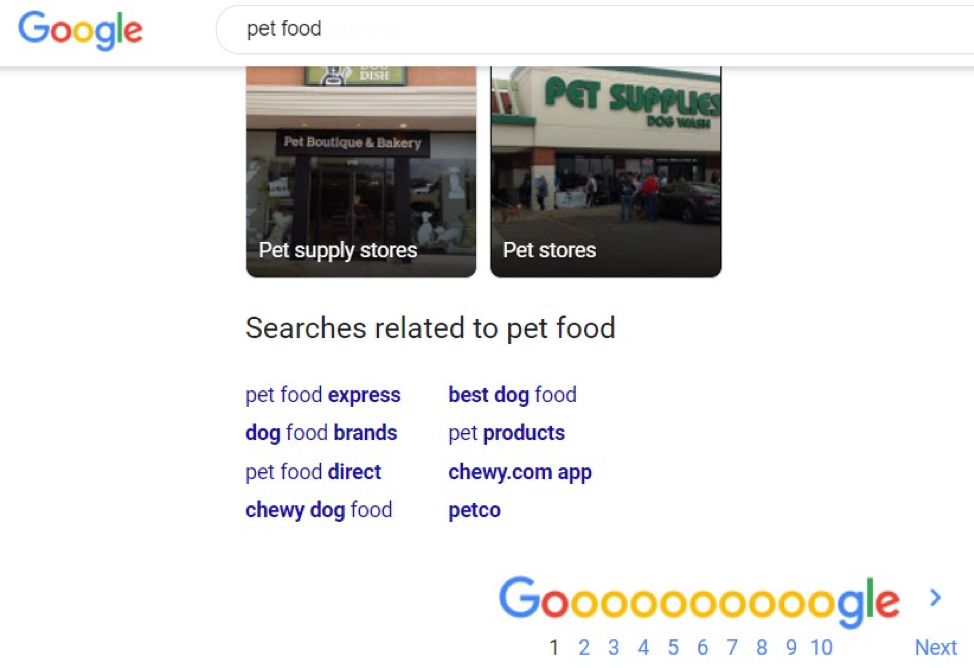
Image via Google
If you click on one of the search terms provided in this section, you get an additional list of keywords.
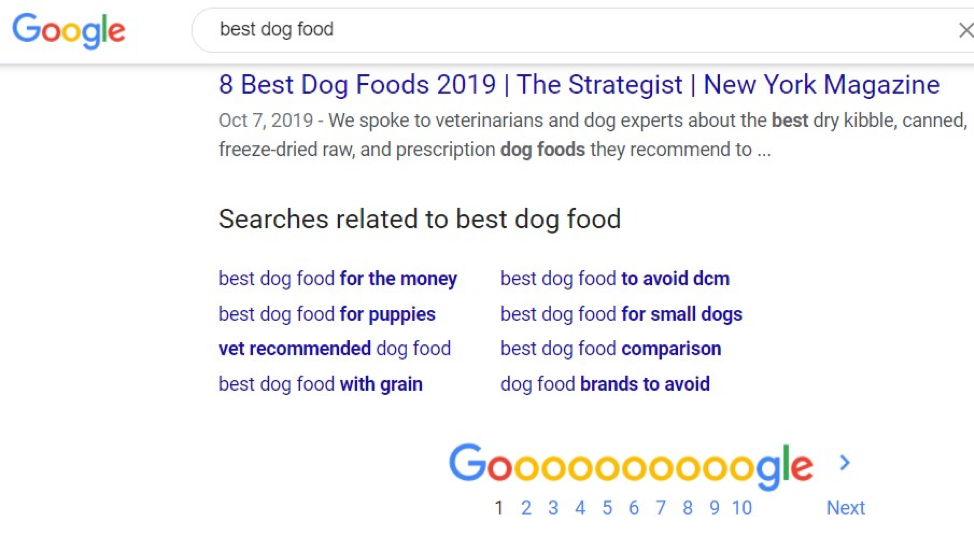
Image via Google
Another option is to use the suggestions provided in Google’s search box when you enter a word or phrase.
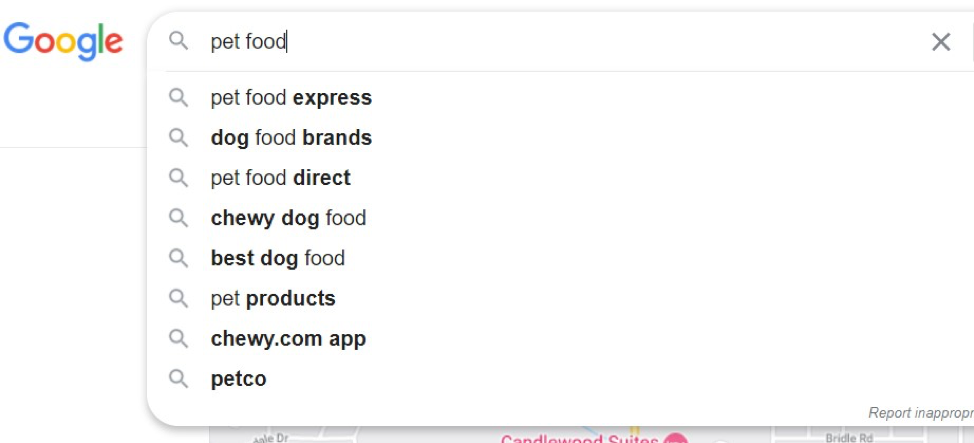
Image via Google
Find Competitor’s Keywords
Want to find out which keywords your competitors target and which they rank for?
Analyze their traffic using competitor analysis.
With it, you can find additional keywords to use, while also finding out what kind of content your audience prefers.
But how do you find competitor keywords?
Use one of the keyword tools discussed below to conduct competitor analysis.
Use Keyword Research Tools
One of the most popular keyword research tools you can use is the Google Keyword Planner.
With it, you can find phrases or words related to what you offer, get insights into how often words are searched for, and how those searches change over time.
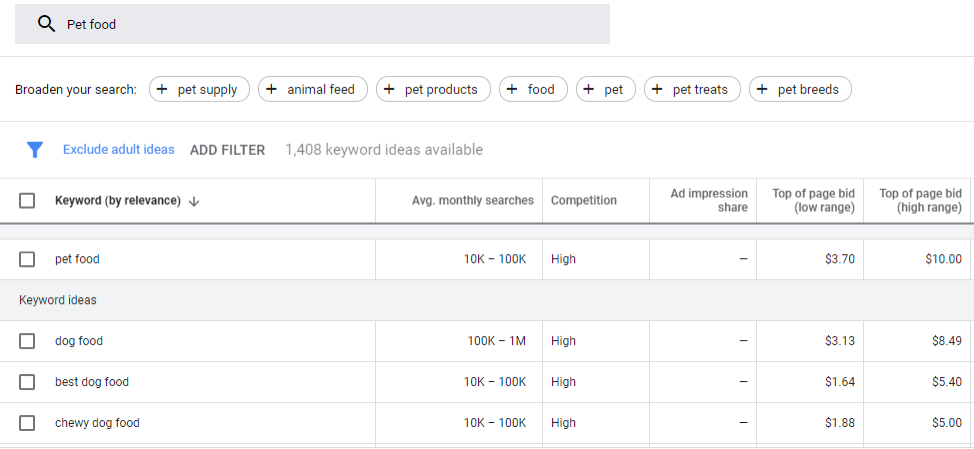
Image via Google Keyword Planner
But it’s not the only tool you can use for keyword research.
Other alternatives to Google Keyword planner include:
- AnswerThePublic
- SEMrush
- KWFinder
- Keywords Everywhere
3. Analyze Keywords
At this point, you need to identify the best keywords from your list, so that you don’t waste time optimizing those that don’t benefit your business.
To do this, consider:
- Your target audience
- Your products or services
- Your customer’s needs
- Your unique value proposition
With this in mind, consult keyword metrics that help you identify your most important keywords.
These metrics include:
Search Volume
Search volume is the number of people searching for a keyword and is available from most keyword research tools.
Keyword Trends
Check the popularity of a keyword and its long-term interest using a tool like Google Trends.
With it, you can track trends over given periods and compare them.

Image via Google Trends
Keyword Difficulty
How hard would it be to rank for a chosen keyword?
If you happen to choose a keyword that’s too competitive, your content may never get to the first page of Google.
However, if you find a keyword with less competition, your chances of ranking in the top three results are much higher. For example, a long-tail keyword like “best dog food for puppies in Detroit.”
Cost Per Click (CPC) and Business Fit
Do people who use a search term spend money and is it relevant to your business?
Try to target keywords with commercial intent and those that relate to what your business offers.
Search Intent
There are various reasons a searcher can use a search term:
- They need to navigate a known site
- They need more information
- They want to buy something
- They are doing research
How can you identify intent?
Let’s use a simple example to explain:
Imagine you are a pet store owner who wants to boost sales.
Now, if you search for a phrase like “best dog food for puppies,” you get:
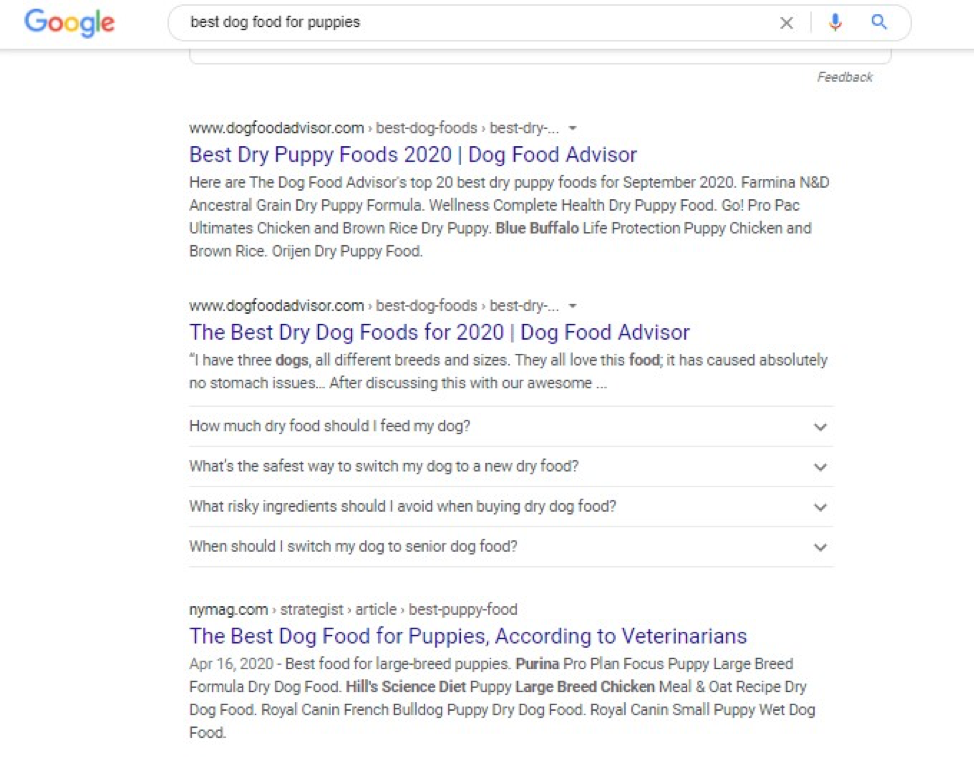
Image via Google
People searching using this term want to compare products, and it would be hard to rank for it if your goal is to sell.
So what do you do?
Find a focus keyword that would suit your business, then match the content to the search intent.
For example, you can write a comparison post of the best puppy foods and include a link to your pet food store.
How can this help your store?
You provide valuable content that can make those ready to buy do so. Your informative content can also keep your brand top of mind when those still browsing are ready to purchase.
Are You Ready to Kickstart Your Keyword Research?
Keyword research is essential if you want to improve your SEO keyword rankings. However, the key to successfully handling it lies in understanding your target customer and their search intent.
You can then find keywords that help you answer their questions and continuously satisfy their needs.
Which tip from our comprehensive keyword research guide will you try first? Please share your comments below.
